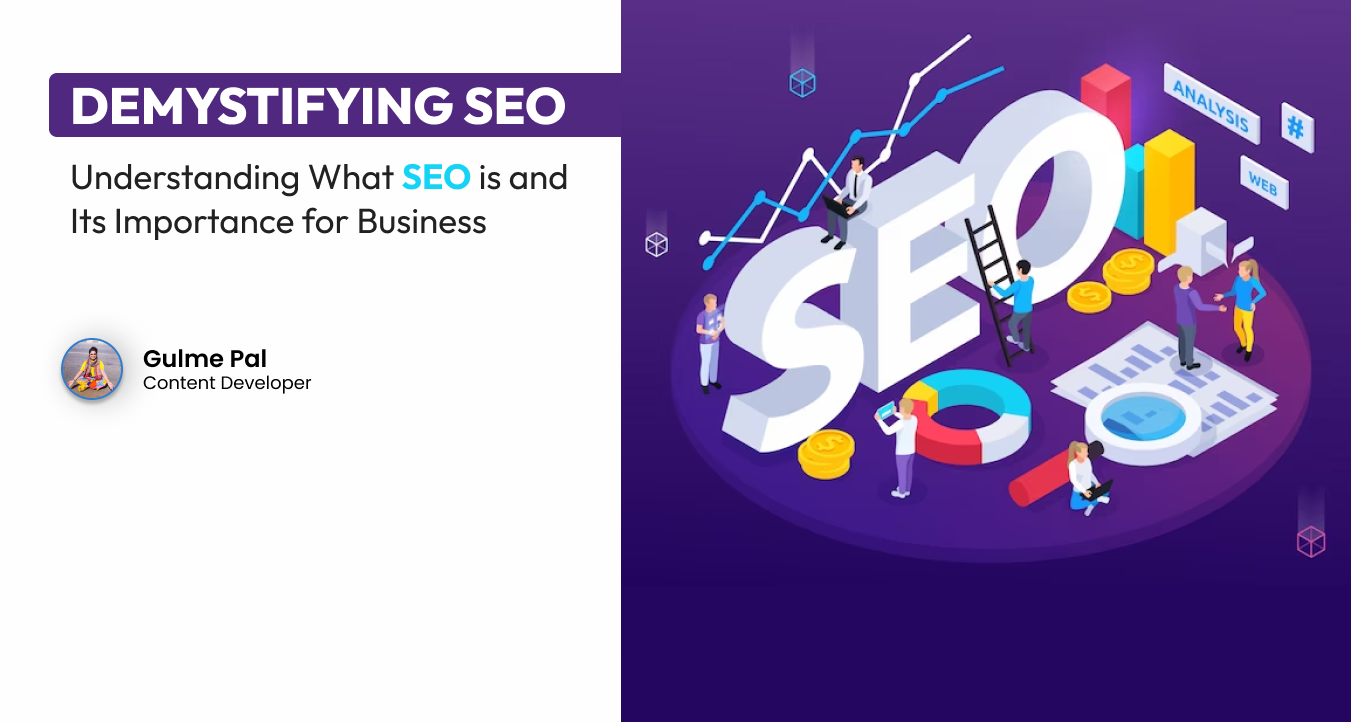Have you ever wondered why certain businesses seem to have an effortless grasp on the Internet market, while others observe it difficult to establish a presence there? Today's lightning-fast digital environment makes Search Engine Optimization (SEO) a vital aspect of success, especially for businesses whose online presence is important. What is SEO exactly, and why should any business, regardless of how small or large, acquire knowledge about the nuances of this online phenomenon?
Understanding the fundamentals of SEO is of the utmost importance for companies looking for success in the competitive marketplace as we make our way through the multifaceted world of digital marketing.
What is SEO?
The strategic process of improving the visibility of a website and ranking on search engine results pages (SERPs) is known as SEO or search engine optimization. It combines technical, imaginative, and analytical procedures to boost a website's relevancy to particular keywords and, eventually, increase organic traffic.
Why We Should Know About SEO?
In the enormous universe of the internet, where hundreds of millions of searches are made every day, understanding SEO resembles having the keys to a virtual entrance of opportunity. Businesses can use search engines to improve their online presence, interact with their target audience, and accelerate their success if they have a thorough understanding of SEO.
Why SEO is Important for Business?
1. Enhanced Visibility: Looking for visibility is the primary objective of search engine optimization. Being listed on the first page of search engine results is a strategic move that has a substantial impact on a business's online reach. A higher ranking assures that prospective clients will find your website before they do that of your rivals.
2. The Value of Being Listed on Search Engine Results Pages: The overwhelming majority of consumers in the digital age use search engines to find products or information. Your business could as well not exist if it isn't shown prominently on the SERPs. Getting listed on these search results pages means that your business is visible where potential customers are looking.
3. Effect on Brand Awareness: SEO is an effective means for increasing brand awareness that goes beyond clicks and conversions. When people see your website first in search results, it builds credibility and trust, which strengthens the way people see your brand as a whole.
How Does SEO Work?
A wide range of aspects on and off a website are made better as part of SEO's numerous operations. This consists of technical SEO, which deals with a website's backend structure, off-page SEO, which concentrates on outside elements like backlinks, and on-page SEO, which optimizes content and HTML source code. Furthermore, local SEO customizes tactics to improve visibility for searches based on location. Each type contributes distinctively to the moulding of a website's online presence and digital footprint.
Business success in the perpetually shifting digital landscape depends critically on comprehending the nuances of SEO. The fundamental component of online visibility is SEO. It functions by aligning the coding, structure, and content of a website with search engine algorithms. The untold heroes of the internet, these algorithms decide where a website appears on search engine results pages. Through the analysis of consumer behaviour and relevance, search engine optimization confirms that businesses are not only found online but also stand out from the crowd. To put it simply, the secret to realizing a company's full potential in the networked world of the internet is to become an SEO expert.
Search engine algorithms, which are intricate formulas that rank websites, are the heart of SEO. By perfecting aspects like header tags, meta descriptions, title tags, and URL structures, on-page optimization ensures that the content is not only pertinent but also simple for search engines to comprehend.
On-Page Optimization:
Effective SEO strategies are built based on on-page optimization. It involves making adjustments to elements on your website directly to improve visibility in search engines and relevancy. The optimization of title tags, and meta descriptions, and carefully placing pertinent keywords within the content constitute essential elements. Improved load times, mobile responsiveness, and user experience are all advantages associated with well-optimized websites. These websites are rewarded by search engines with higher ranks, which ensure that they show up prominently in search results. To improve overall search rankings and drive organic traffic, on-page optimization aligns your content with search engine algorithms, making your website more user-friendly and accessible.
Off-Page Optimization:
Off-Page Optimization: Digital endorsements from other reliable websites, or backlinks, are essential to off-page optimization. Social signals that indicate the relevancy of content, like social media shares and engagement, affect SEO. Keeping an eye on one's online reputation is just as important because goodwill increases a website's legitimacy.
Technical SEO:
Search engines support well-structured sites that are optimized for speed and ease of use. Assuring that your website is usable and accessible on a variety of devices through mobile optimization helps to improve user experience.
Local SEO:
Local SEO approaches play an important role for companies that adapt to the local market. By increasing visibility in particular geographic areas, local search optimization helps businesses connect with their target market.
In broad terms, for businesses looking to break through in the highly competitive online market, an all-encompassing approach to SEO that includes technical considerations, local strategies, and on- and off-page optimization is indispensable.
Practices to Follow and Avoid for Better SEO Results
Being successful in SEO requires not only knowing what to do but also abstaining from damaging behaviours. Ethical SEO techniques involve developing content of the highest calibre, designing relevant and organic backlinks, as well as delivering a satisfying user experience. However, the key to avoiding web search engine penalties is to stay away from black-hat tactics such as keyword stuffing and cloaking.
If handled carefully, the rapidly growing industry of search engine optimization can unlock previously unheard-of levels of business expansion. By removing the layers of SEO, this in-depth analysis anticipates giving businesses the information and resources they need to not only comprehend but also take advantage of search engines' power.
Traffic Generation
The backbone of online visibility is SEO, a process that makes sure businesses are easily found. Appiness thrives on the influx of visitors; SEO acts as the gateway.
- Significance of Organic Traffic:
- The lifeline of ongoing online success is organic traffic.
- A strong organic presence is the basis for long-term growth, as Appiness is aware of.
- How SEO Drives Targeted Traffic:
- By optimizing content for pertinent keywords, SEO attracts the proper audience.
- Appiness uses SEO to make sure its products are in line with what users want to do.
SEO is more than a strategy for Appiness and any other business, it's the key to opening up the gates to a consistent flow of relevant, natural traffic.
Credibility and Trust
SEO escalates a business's exposure and builds credibility by ranking highly in search results. Top-ranking websites are frequently associated with reliability, thereby boosting consumer trust in a brand's products.
- Building Trust through Higher Search Engine Rankings:
- Higher ranks indicate skill and sincerity, giving prospective clients more faith.
- Over time, SEO strengthens a brand's credibility by ensuring a consistent online presence.
- The Role of SEO in Establishing Credibility:
- SEO emphasizes an immense value on high-quality, pertinent content to establish a company as a reliable authority in its sector.
- Improved SEO results in a smooth user experience, that raises a brand's credibility even more.
User Experience
Search engine optimization is essential for businesses because user experience is most important. SEO serves as vital for improving user experience in addition to increasing visibility. Efficient navigation, rapid page loads, and appropriate content are all indications of an optimized website, which gives users a positive experience. User satisfaction is directly impacted by mobile optimization, a vital part of SEO. Search rankings of these websites are positively impacted by Google's mobile-first indexing, which gives them priority. For businesses operating in the digital sphere, SEO investment simply translates to better user satisfaction and customer loyalty.
In a nutshell, the complicated realm of Search Engine Optimization is unquestionably an essential component of the business's online success. SEO is the key to unlocking previously unheard-of levels of growth in the world of digital media, from greater exposure and organic traffic generation to credibility building and improved user experience. Businesses can navigate the ever-changing search engine algorithm landscape, maintain a consistent online presence, and gain the trust of their target audience by comprehending and putting ethical SEO practices into practice. As revealed by Appiness, being an SEO expert is essentially a strategic requirement for any company hoping to succeed in the highly saturated online market.




